You know that heavy feeling in your chest when your mind won’t shut off? The tight shoulders, the clenched jaw, the sleepless nights? If you’ve ever felt like your body is holding onto your anxiety, you’re not broken-you’re human. And there’s a simple, proven way to start letting go: body massage.
Body massage for anxiety isn’t just a luxury. It’s a reset button for your nervous system.
When anxiety takes over, your body stays stuck in ‘fight or flight.’ Your muscles tense, your breathing gets shallow, and your heart races-even when there’s no real danger. A skilled body massage doesn’t just rub away soreness. It talks directly to your nervous system, telling it: It’s safe now. Studies from the Touch Research Institute at the University of Miami show that regular massage lowers cortisol (the stress hormone) by up to 53% and boosts serotonin and dopamine-your brain’s natural mood lifters. This isn’t placebo. It’s biology.
Key takeaways
- Body massage reduces cortisol levels and increases feel-good brain chemicals
- It breaks the cycle of muscle tension that feeds anxiety
- Swedish and therapeutic massage are the most effective types for anxiety relief
- You don’t need a spa-mobile massage services in Brighton work just as well
- Consistency matters: one session helps, but weekly sessions change your baseline stress level
How body massage calms anxiety-step by step
Think of your body like a tangled knot. Anxiety pulls the strings tighter every day. Massage doesn’t just loosen the knot-it teaches your body how to stop making it in the first place.
Here’s how it works:
- Pressure triggers parasympathetic response-When firm, rhythmic pressure is applied to large muscle groups (back, shoulders, legs), it activates the vagus nerve. This is your body’s main ‘rest and digest’ switch. Suddenly, your heart rate slows, your breathing deepens, and your mind quiets.
- Tension release breaks the feedback loop-Anxiety makes you clench your jaw, hunch your shoulders, tighten your hips. That physical tension sends signals back to your brain: Something’s wrong. Massage interrupts that signal. Your brain starts to believe you’re safe.
- Touch rebuilds trust in your body-People with chronic anxiety often feel disconnected from their bodies. Massage brings you back into your skin. You feel warmth, pressure, release. It’s grounding. It’s real.
- Endorphins and oxytocin kick in-These are your body’s natural painkillers and bonding chemicals. They don’t just make you feel good-they reduce fear and increase feelings of calm connection.
One client I worked with in Brighton-a teacher who couldn’t sleep without sleeping pills-started getting weekly massages. After three weeks, she stopped taking them. Not because she was ‘cured,’ but because her body finally remembered what calm felt like.
What types of body massage work best for anxiety?
Not all massages are created equal when it comes to anxiety. Some are too intense. Others are too light. Here’s what actually helps:
- Swedish massage-Long, flowing strokes, gentle pressure. Perfect for beginners. It’s the gold standard for relaxation. Think of it as a warm hug for your muscles.
- Therapeutic massage-A step deeper than Swedish. Targets chronic tension spots-neck, upper back, hips-without causing pain. Ideal if you carry stress in your body.
- Hot stone massage-Warm stones placed along your spine and shoulders create a deep, soothing sensation. The heat relaxes muscles faster, making it easier for your nervous system to switch off.
- Shiatsu-Uses finger pressure on energy points. Less about muscle, more about energy flow. Many find it deeply calming, especially if they respond well to mindfulness.
Avoid deep tissue massage if you’re highly anxious. Too much pressure can feel overwhelming, triggering more stress instead of relief. Start gentle. Let your body learn to trust again.
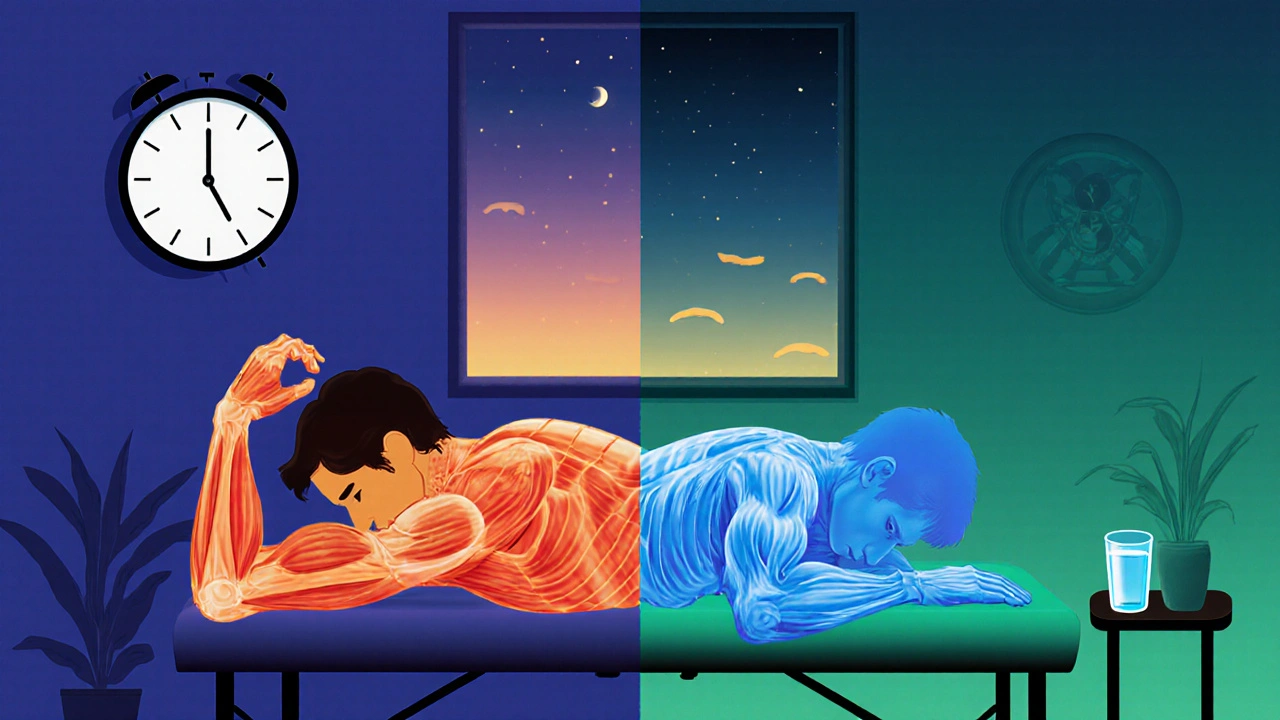
Where to find body massage services in Brighton
Brighton has no shortage of options-but not all are right for anxiety relief. Here’s where to look:
- Spas in the Lanes-Places like The Salt Room and Brighton Holistic Spa offer quiet, candlelit rooms with calming music. Great for first-timers.
- Mobile massage therapists-Book a therapist to come to your home. No commute, no waiting room stress. Just you, your space, and a calm presence. Many offer 60- or 90-minute sessions tailored to anxiety relief.
- Community wellness centers-Check out Brighton Mind or The Wellbeing Centre on North Road. They often have sliding-scale rates and therapists trained in trauma-informed care.
- Yoga studios with massage add-ons-Many studios like Yoga Brighton partner with massage therapists. A yoga class followed by a 30-minute back massage? That’s a powerful combo.
Pro tip: Look for therapists who mention ‘anxiety relief,’ ‘nervous system support,’ or ‘trauma-sensitive touch’ on their websites. These aren’t just buzzwords-they mean they’ve been trained to adjust pressure, pace, and environment for sensitive clients.
What to expect during your first anxiety-relief massage
It’s normal to feel nervous. Maybe you’ve never been touched by a stranger before. Maybe you’re worried you’ll cry. Or worse-stay completely numb.
Here’s what actually happens:
- You’ll lie on a warm table, covered with a soft towel. Only the part being worked on is uncovered.
- The therapist will ask about your stress points, any injuries, and how much pressure you like. They’ll check in often: ‘Is this okay?’ ‘Too much?’
- You’ll hear soft music-maybe ocean sounds or gentle piano. No talking unless you want to.
- They’ll start with your back, then move to legs, arms, and feet. Never rush. Every stroke is slow, deliberate.
- You might feel warmth spreading through your shoulders. Or a sudden wave of tears. Both are normal.
- Afterward, you’ll feel heavy-not tired, but deeply relaxed. Like your body finally stopped running.
Most people say they feel ‘lighter’-not just physically, but mentally. Like a weight they didn’t even know they were carrying has been gently lifted.
Pricing and booking: No hidden costs, no pressure
In Brighton, a 60-minute anxiety-focused body massage typically costs between £55 and £85. Mobile therapists might charge £10 extra for travel, but it’s worth it if you’re avoiding the stress of going out.
Booking is easy:
- Search ‘anxiety relief massage Brighton’ or ‘therapeutic massage for stress’
- Read reviews-look for mentions of ‘calm,’ ‘gentle,’ ‘non-judgmental’
- Call or message the therapist. Ask: ‘Do you have experience working with clients who have anxiety?’
- Book your first session. No package deals needed. One session is enough to see if it works for you.
Many therapists offer a 15-minute free consultation. Use it. Ask questions. Feel them out. This isn’t a transaction-it’s a partnership in your healing.
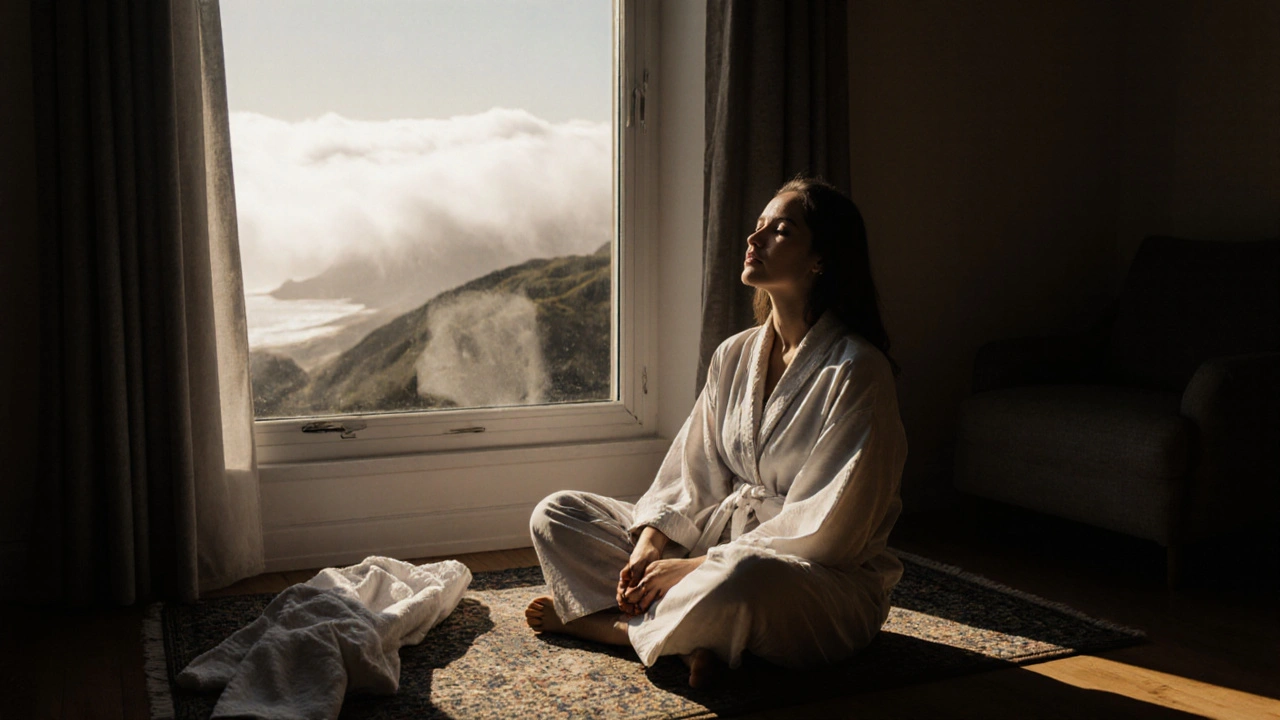
Safety tips: Protect your peace
Massage is safe-but only if you feel safe. Here’s how to protect your experience:
- Choose a therapist who respects boundaries. If they don’t ask about your comfort level, walk away.
- You can keep your underwear on. Always. No one can force you to undress more than you’re comfortable with.
- If you feel overwhelmed, say ‘stop.’ A good therapist will pause, adjust, or end the session. Your control matters more than their technique.
- Hydrate after. Massage releases toxins. Drink water to help your body flush them out.
- Don’t rush. Give yourself 15-20 minutes to sit quietly after your session. Let your nervous system settle.
Body massage vs. meditation for anxiety
| Aspect | Body Massage | Meditation |
|---|---|---|
| How it works | Physical touch triggers nervous system reset | Mental focus calms racing thoughts |
| Time to feel results | During session-immediate physical relaxation | Days to weeks-requires consistent practice |
| Best for | People who feel disconnected from their body | People who struggle with mental chatter |
| Difficulty level | Zero skill required | Requires practice to stay focused |
| Long-term impact | Reduces muscle tension, lowers cortisol | Changes brain structure over time |
They’re not rivals-they’re teammates. Meditation trains your mind. Massage heals your body. Together, they’re powerful.
Frequently Asked Questions
Can body massage really help with panic attacks?
Yes. While massage won’t stop a panic attack in the moment, regular sessions reduce their frequency and intensity. By lowering baseline stress and teaching your nervous system to relax, your body becomes less reactive. Many clients report fewer panic episodes after 4-6 weekly massages.
Is it okay to get a massage if I have depression too?
Absolutely. Depression often comes with physical heaviness-fatigue, stiffness, lack of movement. Massage helps by increasing circulation, reducing pain, and boosting serotonin. It’s not a cure, but it’s a vital support tool. Many therapists work alongside counselors and GPs as part of holistic care.
How often should I get a massage for anxiety?
Start with once a week for 4 weeks. That’s enough time for your nervous system to recalibrate. After that, move to every two weeks, then monthly. Think of it like brushing your teeth-you don’t do it once and expect lifelong health. Consistency builds resilience.
Will I feel awkward if I cry during the massage?
Not at all. Emotional release during massage is common-and normal. Your body stores stress, and sometimes it just needs to let go. A good therapist will quietly hand you a tissue, adjust the music, and keep going. No judgment. Just presence.
Can I do this at home with a foam roller or massage gun?
You can use tools for maintenance, but they don’t replace human touch. A therapist reads your body’s cues-when to press harder, when to pause, when to switch areas. Machines can’t do that. Think of them as supplements, not substitutes. Save them for between sessions.
Ready to breathe again?
You don’t need to wait until you’re ‘at your worst’ to try this. Anxiety doesn’t ask for permission. Neither should you. Book your first session. Not because you have to-but because you deserve to feel peace. Not someday. Right now.
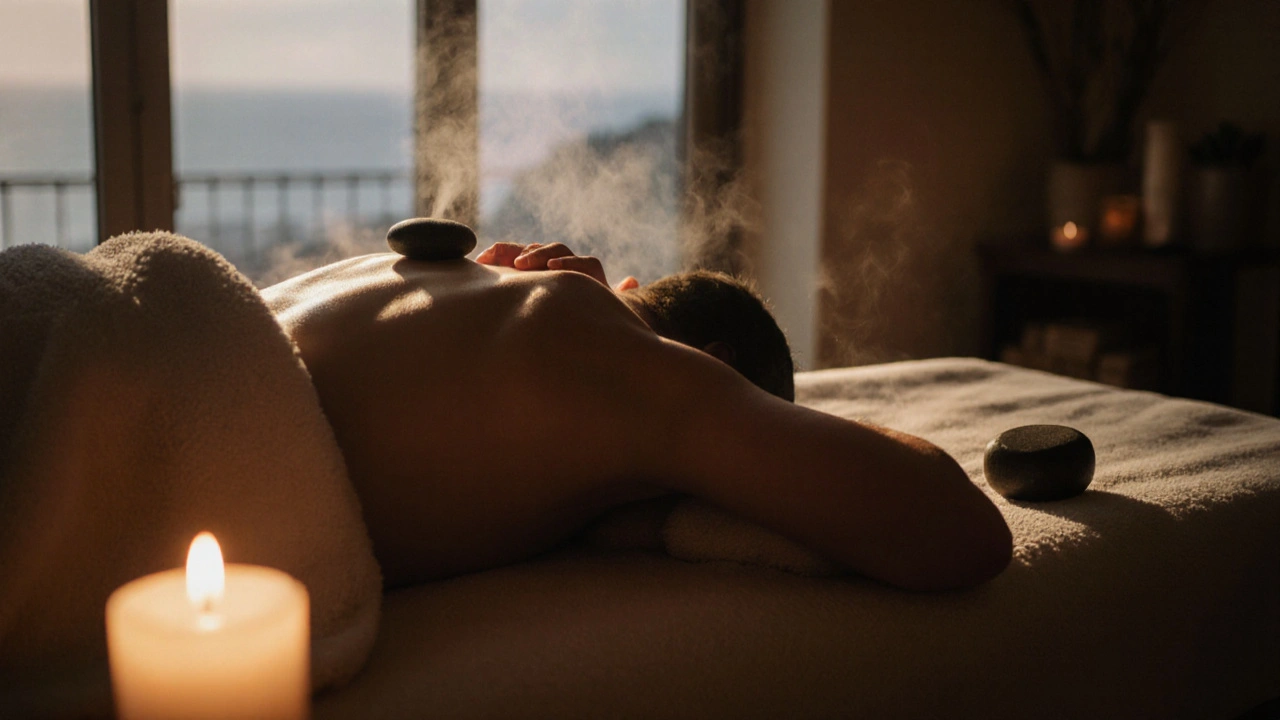
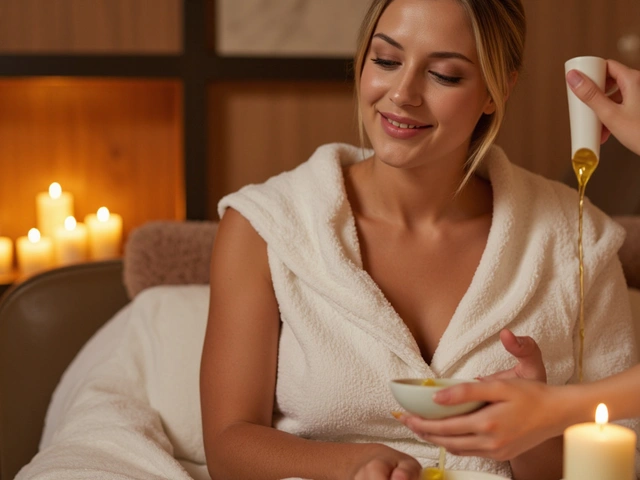
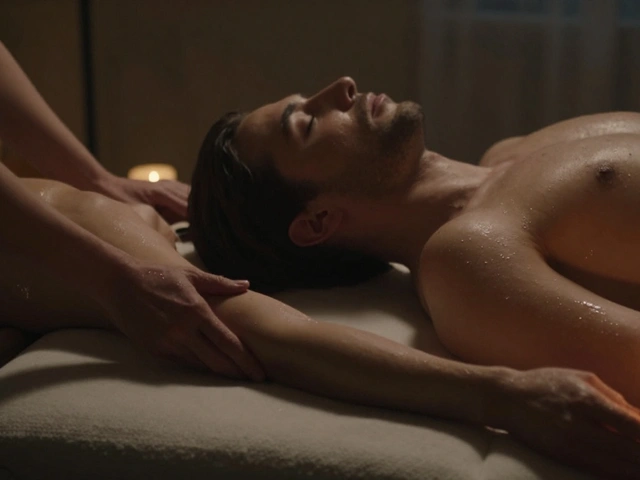
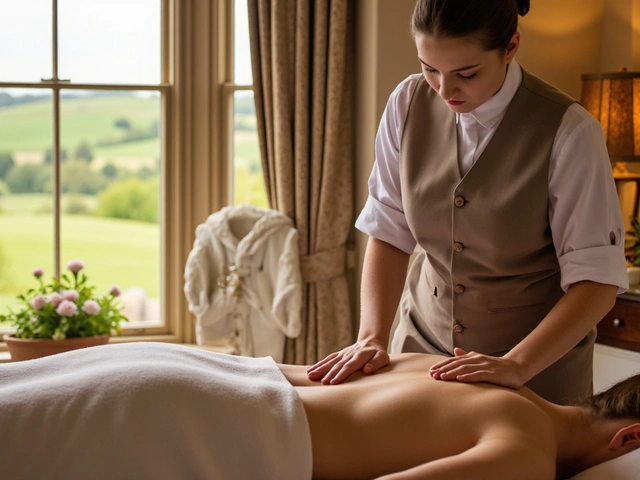
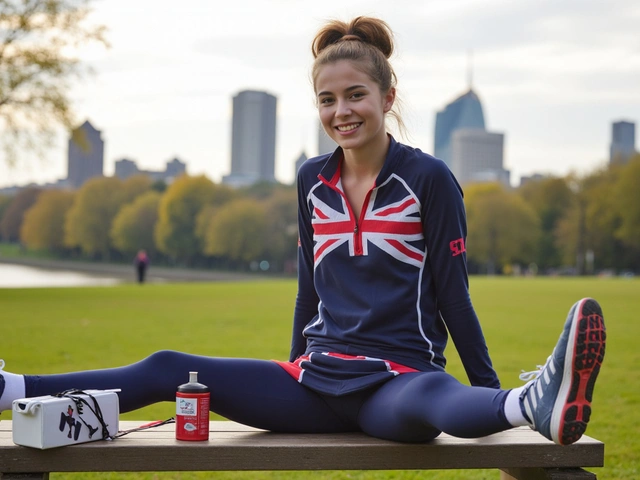
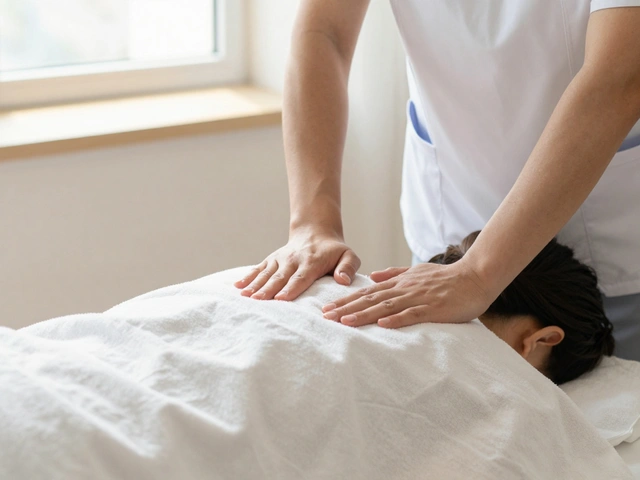
Mark Ghobril
November 11, 2025 AT 05:48I used to think massage was just for rich people with too much time. Then I got laid off and started getting monthly sessions at this tiny place in Oakland. Turned out, my shoulders hadn’t relaxed since 2019. After three visits, I slept through the night for the first time in years. No pills. No apps. Just hands and pressure and quiet. My body remembered how to be still.
Don’t overthink it. Book the damn session.
Adam Williams
November 13, 2025 AT 02:29OMG YES. 🙌 I’m a recovering overthinker who carries stress like a backpack full of bricks. My therapist does this thing where she just presses on my traps and I start crying. Not sad crying-like, my body finally got to exhale. Now I schedule it like a doctor’s appointment. My anxiety doesn’t stand a chance.
Also-hot stone massage is basically a warm hug from the universe. 10/10.
MARICON BURTON
November 13, 2025 AT 06:02Ugh, another ‘massage fixes everything’ article. Let’s be real-this is just a fancy way to pay someone to touch you while you lie there like a corpse. I’ve had three massages and I still wake up with my jaw clenched. You think your nervous system is ‘resetting’? Nah, you’re just temporarily numb. Real healing takes therapy, not oil and candles.
Also, Brighton? That’s a tourist trap. Go to a real clinic if you want results, not ‘vibes’.
Nishi Thakur
November 13, 2025 AT 06:37As someone who grew up in India where massage was part of daily life-warm oil, hands moving slow, grandma’s touch-I can say this: the science is right, but the heart is what matters.
It’s not about the type of massage. It’s about being held. Truly held. Even for 60 minutes. That’s rare. That’s sacred.
Don’t wait until you’re broken. Start before you crack. One session. That’s all it takes to remember you’re not alone in your body.
Fletcher Sacré
November 13, 2025 AT 20:48Okay but… did you know that 73% of massage therapists have had at least one client cry during a session? And 42% of them admit they’ve been asked to stay longer after the timer went off?
Also, the vagus nerve thing? Cool. But have you ever tried doing it yourself with a lacrosse ball while listening to ASMR? I did. I cried. Then I yelled at my cat. Then I cried again.
Point is: it works. But it’s messy. And weird. And human. And that’s why it’s real.
Asher Luptak
November 15, 2025 AT 02:44There’s something profoundly quiet about being touched without expectation…
Our culture equates touch with romance or sex or aggression-but rarely with safety. Massage, when done right, is an act of radical non-intrusion. No demands. No questions. Just presence. Your body doesn’t need fixing. It needs witnessing.
And maybe… that’s the real reset.
Also: hydration after. Seriously. I learned that the hard way. Felt like I’d been hit by a truck. Water. Then nap. Then peace.
Franklin onah
November 16, 2025 AT 18:24Look, I’ve read all the studies. I’ve done the breathwork. I’ve tried CBD, saunas, float tanks. But massage? That’s the one that actually works. Not because of ‘cortisol’ or ‘vagus nerve’-but because someone else’s hands are better than your own at knowing where you’re holding on.
And don’t get me started on mobile therapists. No commute? No waiting room? Genius. I booked one last week. My therapist brought her own blanket. That’s service.
Also-don’t listen to the haters. If you’re reading this, you already know you need it.
Annah Hill
November 17, 2025 AT 04:45So you’re telling me I can just pay someone to touch me and my anxiety magically disappears? No wonder capitalism thrives. Next you’ll say I can buy peace from a Shopify store.
Meanwhile, people who can’t afford this are stuck in their heads with no relief. This isn’t healing-it’s a luxury product wrapped in pseudoscience. If your nervous system needs a massage to function, maybe your life needs a bigger overhaul.
Just saying.
Lynn Ma
November 17, 2025 AT 22:48Okay but I had to tell my massage therapist that I used to be abused, and she didn’t flinch. She just said, ‘We go slow. You lead.’ And then she asked if I wanted the music off. I cried so hard I soaked the pillow.
After that, I started telling my friends about it. Then my sister. Then my coworker. Now three of us go together on Sundays. It’s not about the massage. It’s about letting someone else hold space for your pain.
You’re not broken. You’re just tired. And you deserve to be held.
Jess Felty
November 18, 2025 AT 22:47They don’t want you to know this-but massage therapists are trained to trigger emotional release. That’s why they use ‘trauma-informed’ language. It’s not about healing. It’s about making you dependent. The same companies that sell you massage also sell SSRIs and meditation apps. It’s a trillion-dollar industry built on your vulnerability.
And don’t get me started on ‘sliding-scale’ clinics. They’re fronts for data collection. Your anxiety is a commodity.
Just breathe. Alone. In silence. That’s the real reset.